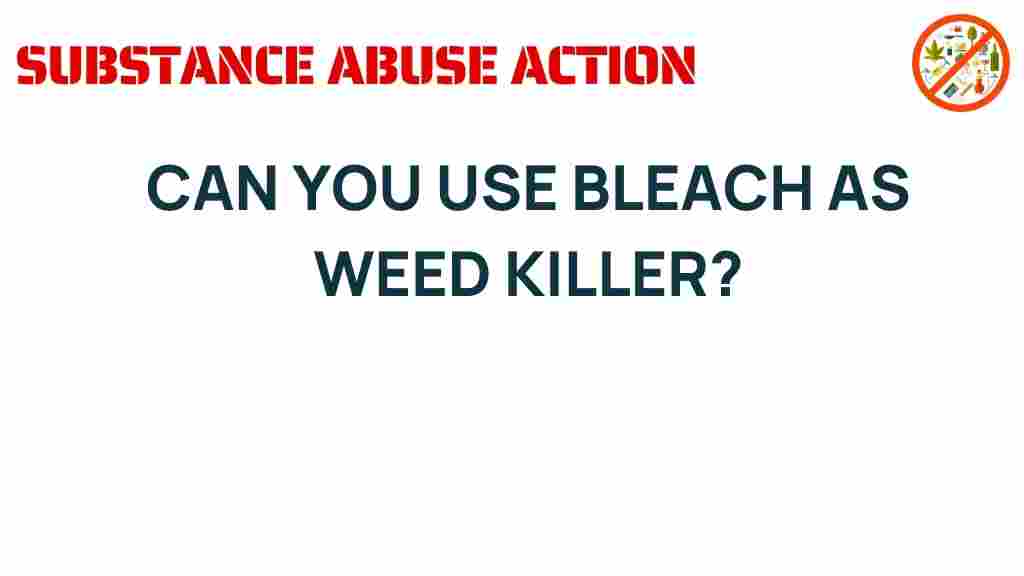Unconventional Solutions: Can You Really Use Bleach as Weed Killer?
Gardening enthusiasts and homeowners often find themselves in a battle against unwanted weeds that threaten the health and beauty of their plants. While many turn to traditional herbicides for quick results, the quest for more natural or unconventional solutions has led some to consider household items like bleach as a potential weed killer. In this article, we will explore the efficacy of using bleach in your garden, how it compares to chemical solutions, and what you need to know to use it safely.
What is Bleach?
Bleach, primarily composed of sodium hypochlorite, is a powerful disinfectant commonly used in household cleaning. Its effectiveness in killing bacteria and viruses is well-documented, but its role in plant care is less clear. Some gardeners believe that its herbicidal properties can help eliminate unwanted weeds without resorting to commercial herbicides.
Understanding Weeds and Their Impact on Gardening
Weeds compete with your desired plants for nutrients, water, and sunlight, often leading to stunted growth or even death of the plants you wish to cultivate. Understanding the types of weeds present in your garden can help you decide the best method for control. Common types include:
- Annual Weeds: These complete their life cycle in one growing season.
- Perennial Weeds: These live for multiple years and can be more challenging to eliminate.
- Biennial Weeds: These take two years to complete their life cycle.
Now, let’s delve into whether bleach can serve as an effective weed killer.
Using Bleach as Weed Killer: A Step-by-Step Guide
If you decide to try using bleach as a weed killer, it’s essential to proceed with caution. Here’s a step-by-step guide to help you use bleach safely in your garden:
Step 1: Gather Your Supplies
You will need the following items:
- Household bleach (preferably unscented)
- Water
- Spray bottle or garden sprayer
- Protective gear (gloves, goggles, mask)
Step 2: Prepare the Bleach Solution
To use bleach effectively as a weed killer, mix a solution that is strong enough to kill weeds but dilute enough to minimize damage to surrounding plants. A common ratio is:
- 1 part bleach to 3 parts water
Always mix this solution in a well-ventilated area, and ensure you wear protective gear to avoid skin irritation and inhalation of fumes.
Step 3: Apply the Solution
Use a spray bottle or garden sprayer to apply the bleach solution directly onto the weeds you wish to eliminate. Be cautious to avoid spraying nearby desirable plants, as bleach can harm them as well.
Step 4: Monitor and Repeat if Necessary
After applying the bleach solution, monitor the area over the next few days. You may need to reapply the solution if the weeds do not show signs of wilting or dying.
Consider the Risks of Using Bleach
While using bleach can be an effective way to tackle weeds, it comes with several risks that you should consider:
- Plant Damage: Bleach is non-selective; it kills any plant it touches, including your flowers and vegetables.
- Soil Health: Over time, bleach can negatively affect soil health and microbial life.
- Health Hazards: Inhalation of bleach fumes can cause respiratory issues, and direct contact can cause skin irritation.
- Environmental Concerns: Bleach may contaminate groundwater and harm beneficial insects and wildlife.
Alternative Home Remedies for Weed Control
If you’re hesitant about using bleach, there are several other home remedies that can serve as effective weed killers:
- Vinegar: The acetic acid in vinegar can kill weeds effectively. Use a solution with at least 10% acidity for best results.
- Boiling Water: Pouring boiling water directly onto weeds can effectively kill them without harming the surrounding soil.
- Salt: A mixture of salt and water can be an effective weed killer. However, use sparingly, as it can damage soil health.
- Mulching: Applying a thick layer of mulch can suppress weed growth by blocking sunlight.
Troubleshooting Common Issues
As with any gardening hack, using bleach as a weed killer can come with its challenges. Here are some common issues and troubleshooting tips:
Problem: Weeds Are Not Dying
Solution: Ensure you have mixed the correct ratio of bleach and water. Consider applying the solution directly onto the leaves of the weeds for better absorption. If you are dealing with tough perennial weeds, you may need multiple applications.
Problem: Nearby Plants Are Affected
Solution: Be extremely careful during application. Use a shield or cardboard to block nearby plants from overspray. You may need to consider alternative methods if you frequently encounter this issue.
Problem: Bleach Smell Lingers
Solution: Ensure you are working in a well-ventilated area. If the smell is strong, consider using odor-neutralizing agents or ventilating the space better.
Conclusion: Is Bleach the Right Choice for Your Garden?
Using bleach as a weed killer is certainly an unconventional solution that comes with its pros and cons. While it can effectively eliminate weeds, the risks to your plants and soil health should not be overlooked. For those who are cautious about chemical solutions, exploring home remedies like vinegar or boiling water may provide safer alternatives.
Ultimately, the choice is yours. If you decide to experiment with bleach, always prioritize safety and consider the long-term health of your garden. Whether you opt for bleach, traditional herbicides, or natural methods, maintaining a healthy and thriving garden is the ultimate goal.
For more gardening tips and tricks, check out our comprehensive guide on gardening hacks that can help you maintain a beautiful outdoor space!
For further reading on the environmental impact of household chemicals, refer to this external source.
This article is in the category Health and created by SubstanceAbuseAction Team
